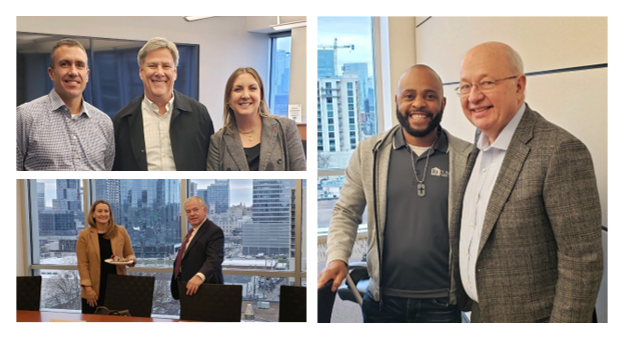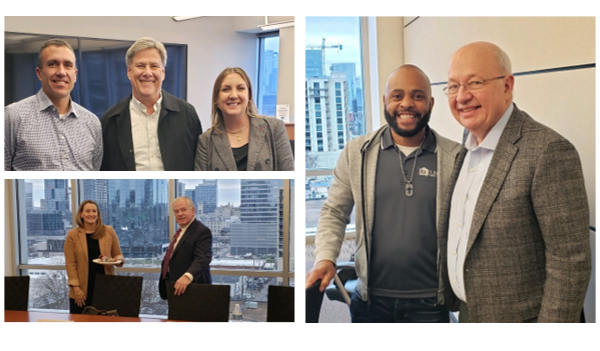Key Take Aways from February 2023 Meeting!
Sam Sarbacker (Oman-Gibson Associates): OGA is a medical developer. Sam feels like we will see more rate rises in 2023 than the market is thinking. He is continuing to see medical go towards outpatient and the rural areas are continuing to struggle because of staffing issues. He also mentioned that he is seeing dormant mall buildings become medical centers. He feels that Hickory Hollow is headed in this direction.
Vic Alexander (Kraft CPA’s PLLC): Vic is still seeing many of his clients in the real estate industry doing well. He thought he would see a decline because of the rising interest rates but he feels the precursor to this is that the engineers are still pretty busy. He is on a trust that have 28 multi-family residential apartments and the occupancy rates are staying at 97-98%. He is hearing about a softness in the market in the leasing environment, but he feels that is upper tier properties and maybe they are having a bit more difficulty trying to get those leased.
Jim Murphy (Bradley Arant Boult Cummings): Jim does a lot of land use and he, also, has not seen a slowdown. He feels that there are less new deals starting but when he feels things are slowing down, he will receive a call for several more deals. There is a bit of uncertainty in Metro because of the Mayoral race and not knowing who will be running and who will be in leadership. He also mentioned there is bit a frustration with Codes and being able to get approvals completed. Metro still has a staffing issue.
Chuck Gannaway (Hastings Architecture): Most of Chuck’s work is in Nashville. He has a diverse practice with respect to the type of work that they do. His office clients are investing in amenities and upgrades of properties so that they can be more competitive in Nashville and Williamson County. He is seeing that his higher ed clients, i.e., Vanderbilt, are continuing to build.
Barry Greer (RK Junior): Barry is an Asset and Acquisition Manager where he mainly works primarily in residential homes. He said that he is seeing where banks have slowed down giving money, but he is seeing a lot of private equity reaching out now. He is seeing where decent builds will go quicker, but he cannot presell homes now as well as he could previously. It is definitely finished products going out the door quicker.
Steven Culp (W. E. O’Neil): Steven has not really seen a slowdown, but he is noticing a shift where projects are getting smaller. He feels that developers are looking to lower their risk profile. He is also noticing a bit of a shift by developers to industrial from multi-family projects. There is a shift from the larger multi-family (200) units to smaller (7-8) unit projects.
Kelly Cochran (State of Tennessee Real Asset Management (STREAM)): Kelly is surprised that the State is considering walking away from $1 billion for higher education institutions and that would make Tennessee that first state to do that. Her concern is that she hopes it is only for education and not the other 26 agencies that she represents because she leases office space for government agencies. She also mentioned that more employees are coming back into the office, but not everyone. She did mention that certain agencies are returning, i.e., Child Protective Services, but that will not be the norm.
Chris Green (Terracon): Chris fells like Nashville has leveled out from the past four years but has seen the “hair on fire” in other industries such as Chattanooga. He went on to mention that Chattanooga and Memphis are busy. He is noticing a mix of projects – large, small, national accounts such as Whataburger, etc. There are some pauses happening, large multi-projects have slowed down, and construction costs have calmed down. He went on to mention that there is a huge construction in solar, mainly in West TN.
Mia Keller (The Pizzuti Companies): Mia mentioned that although they developed the Joseph Hotel, they primarily develop industrial, warehousing space, multi-family, both urban and suburban and some build-to-suit for some retail clients. She mentioned that they have Pizzuti Solutions that is based in Columbus, OH that act as an owner representative for municipalities and non-profits to help facilitate and project manage certain projects such libraries, expansions, and certain other facilities. She also mentioned that they are still struggling with the urban multi-family projects in Nashville, mainly because of costs and a variety of reasons but her team is on a construction project for a high rise in Chicago. She went on to say that there are 25,000 multi-family units under construction in Nashville, mainly downtown and she is seeing 34% of rental concessions offered.
Lee Hunter (CapStar Bank): Lee mentioned that interest rates are still up. They are still closing loans and are making loans to strong clients. He also mentioned that short-term rates are usually higher than longer term rates, but today 1-month rates are almost 1% higher than a 10-month rate. He also mentioned that it is a strange time in banking and bankers will be more selective and will rely on a deposit first mentality. He feels that there is so much cash sitting on the sidelines waiting for the right opportunity.
Diana Johnson-O’Brien (CBRE | Southeast Research): Diana is in market research at CBRE. She feels that office is more challenging, and the demand is shifting because of downsizing. On a positive note, she is seeing more interest in Tennessee – Nashville, Knoxville, Chattanooga. She is trying to keep a pulse on the market performance. There is a lot of interest in industrial, build-to-suit, land development, etc.
Tom Gregory (CT Consultants, Inc.): Tom is with CT Consultants, which is a multi-disciplinary civil engineering firm that operates in both private and public markets. Business is still good for him and it’s great to be in Nashville, but he is sensing a downturn. He said that the big box industrial is insane but on the other hand it is difficult to get sites and he is noticing that communities are less interested. He did mention that industrial manufacturing is still pretty strong, and he believes that the smaller developers are impacted more than the larger ones. He also said that Spring Hill is the hottest area right now but may come to a halt if they do not get water and sewer going. A lot of communities are spending money that they have received from the government. He mentioned that construction has tapered off because it’s a challenge to get electrical equipment, but the pricing has tempered from what it was.
Jennifer Grimson (Google Fiber): Jennifer only works with developers, owners, and managers of multi-family specifically and they provide the infrastructure at no cost, unlike their competitors. They are interested in expanding the footprint of Google Fiber and they are aggressively doing that in this market. This is not only a money maker, but a money saver. She has noticed that the developers switch their directions on many occasions, but she is interested in being part of the conversation here in Nashville. If a building is being built and there is dirt, she would love to come out and see as they will draw a design and put the fiber in. They prefer to put the fiber in the ground but have used Webpass in the downtown area as it will deliver the signal wirelessly.
Michael Pellatt (ICMS Group): Michael works at ICMS, which is a global industrial science engineers and construction managers, where he is doing consulting work in multi-family mix-use types of projects. He said that the bigger developers are coming back in and looking for deals. He said that he is seeing where “cash is king” and the equity requirements are getting up to 45% and the smaller developers can’t foot that bill. He is advising his clients to be patient and the market will come back possibly in the middle of next year. He said the biggest thing that he sees right now is that a lot of people are re‑trading and waiting for better deals. He says that it is not panic time.
Ryan McMaster (Kimley-Horn): Ryan is a civil engineer at Kimley-Horn, which is a multi-disciplinary firm across the country and here in Nashville he focuses on private land development throughout Middle Tennessee, especially in Williamson County and Franklin. He mentioned that they experienced real business risks that came with taking on too much work over the past year and for the first time in his career, he had to make some difficult decisions about which clients they could serve well. Historically, they have been heavy in multi-family and industrial and they have a couple rising groups in solar EV and single-family that has gained momentum here in Middle Tennessee. He mentioned Metro review is still a challenge.
Declan McGarry (NAI Nashville Stanton Group): Declan works at NAI – a full-service commercial real estate firm and property management company located in Brentwood. He currently does a lot of retail simply because it’s a lot of work out there now. He mentions that office is a challenge. Smaller spaces have a bigger demand, especially for those that have been built out. He can’t see people ever coming back to the office. He feels that hybrid is here to stay because 90% of the workforce does not want to return to the office. He noted that newer companies, start-ups, etc., are more flexible with hybrid but the bigger companies want the office space.
Jeff Hammers (Real Estate Ventures LLC): Jeff is seeing the same thing – permits taking forever, costs, etc., but he really thought 2023 was going to slow down and it hasn’t. He’s pleasantly surprised and cautiously optimistic. We just learn to adapt, as we have.
Matt Cooper (Sagemont): Matt is with Sagemont Real Estate, and they are a local commercial real estate firm. They represent local owners and developers, a few mixed-use adaptive projects. He said that there is a 2-3% vacancy rate in non-mall retail product and 8-10% rent growth year to year in Nashville. Limited products are due to limited ground breaks in retail as sites are tough to find. He is seeing a lot of tenants from out of town that quickly realize that they are up against other tenants for the same space. So, this gives landlords a broad leverage limit concessions and tenants are trying to find space close to move-in ready. Retail is seeing a lot of medical tenants – dentals, vets, chiropractors, etc. He said that they have cracked $100 a square foot net on some retail development.
Tom Trent (Bradley Arant Boult Cummings): As the economy waffles, incentives become more valuable and makes a difference in making deals work, particularly in offices with affordable components. It becomes like pseudo equity. They are big into solar, probably the largest solar practice in the South.
David Lister (Kraft CPA’s PLLC): David is a tax partner at Kraft and he works with a lot of real estate, high net worth, construction clients. He’s seeing a lot of money being taken off the table here in Nashville. Clients are moving to other southeastern cities. The governor just mentioned that there is a surplus of cash, so now is the time to cut taxes and give money back. The biggest will be the franchise and excise tax, which most businesses pay. This will probably be equivalent to getting $4,500 back in each taxpayers pockets and a three-month sales tax.






Recent Comments